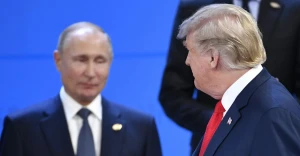
Putin's war plans linked to two key factors – journalist Portnikov
Journalist Vitaly Portnikov says Putin's decision to continue the war depends on two factors: Russia's economy and military strength
He shared his insights on Espreso TV.
"Putin's plans to continue the war depend on two things. First, the state of the economy. Saying the war won't end in 2025 makes sense only if Russia's economy stays strong. Predicting the war could go on for years is accurate if Putin maintains a powerful army. Any guesses about 'how long it will last' depend not on what Putin might negotiate with Trump but on Putin's power and how Trump reacts if he sees Putin isn't willing to negotiate. If Trump keeps Biden's sanctions in place, it would be devastating for Russia's economy," Portnikov explained.
He noted that Ukrainian attacks have knocked out 10% of Russia's oil refining capacity, causing significant losses. Russian railways can't keep up with the demand to transport oil already bought by foreign buyers, as most freight lines are tied up by the war effort. This logistical crisis worsens each month the war drags on.
"Russia is pumping a lot of oil but can't sell it because of sanctions on tankers. On February 14, a Russian delegation went to India, trying to convince them to buy oil from sanctioned tankers. The Indians responded, 'We won't buy under the sanctions regime, no matter the price.' Russia now has massive amounts of unsellable oil and no way to transport it. This means they'll have to shut down wells, cut production, and scale back refining within six months. And that's just about oil — there are also issues with gas and metal tariffs. All of Trump's tariffs hit not just us and Europe but also Russian metallurgy, which is another serious blow," the journalist stressed.
Portnikov concluded by saying the big question, for which he has no answer, is how well the Russian economy can handle these challenges.
- U.S. President Donald Trump spoke with Russian leader Vladimir Putin on February 12.
- On February 13, Trump announced that Russian and U.S. officials would soon meet in Saudi Arabia to discuss the war. He mentioned that Ukraine would also participate. The next day, Zelenskyy confirmed his plans to visit Saudi Arabia but said no meeting with Russian representatives was planned.
- Later, it was revealed that the Ukrainian president would only negotiate with Putin after aligning with Europe and the U.S. on a plan to end the war.
- News











































